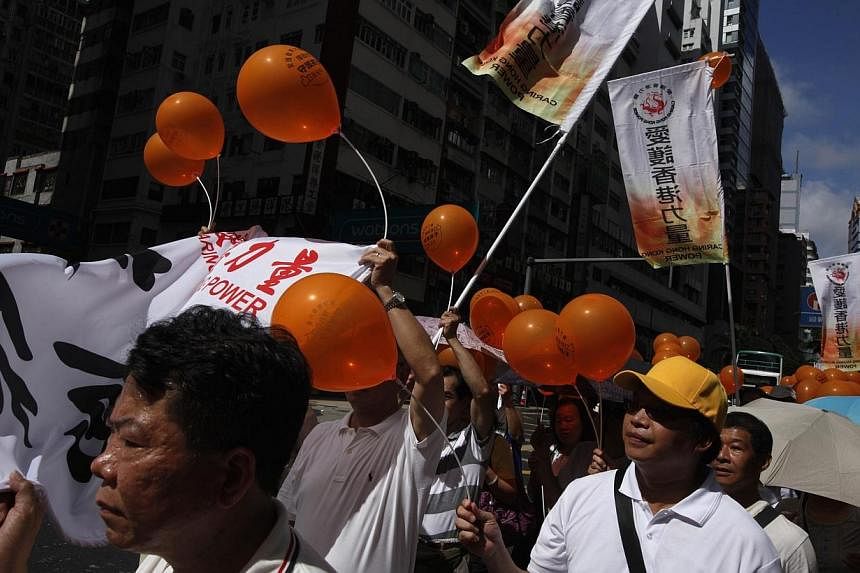HONG KONG (AFP) - Hundreds of thousands of protesters are set to take to the streets in Hong Kong on Tuesday in a pro-democracy rally which organisers say could be the largest since the city was handed back to China.
The protest march comes after an informal poll on democratic reform drew an unexpectedly high turnout of nearly 800,000 votes, but was branded "illegal and invalid" by Beijing.
Organisers expect more than half a million people to join the rally as concerns grow over China's increasing influence over the city.
July 1 is traditionally a day of protest in Hong Kong and also marks the anniversary of the handover from China to Britain in 1997, under a "one country, two systems" agreement.
That agreement allows residents civil liberties not seen on the mainland, including free speech and the right to protest.
But there are heightened fears that those freedoms are being eroded.
There has been a spate of attacks on media workers in recent months - including the brutal stabbing of a liberal former newspaper editor - while pro-democracy media have complained of massive cyber-attacks.
Concerns increased in June when Beijing published a controversial "white paper" on Hong Kong's future that was widely seen as a warning to the city not to overstep boundaries.
"Public sentiment has dropped to the lowest point since 2003. I believe more people will come out," Mr Johnson Yeung, one of the key rally organisers, told AFP.
The 2003 march saw 500,000 people protest against a proposed national security bill, forcing the government to shelve it.
It was a key factor in the resignation two years later of the chief executive Tung Chee-hwa.
Tuesday's march starts at Victoria Park at 3pm and heads to the city's Central district.
Two student groups have said that they will hold an overnight rally to "occupy" a Central street and an area outside the government headquarters, following the march.
One of the group's leaders, Mr Joshua Wong, said on Monday the student rally would be held to vent "anger" towards the authorities, but would be peaceful.
Pro-democracy group Occupy Central, which organised the successful referendum, has said that it will stage a mass sit-in in the city's business district later this year unless authorities come up with acceptable electoral reforms.
The 10-day unofficial poll, which ended on Sunday, gave three options for voters in the elections for the city's leader, all of which included the public having some influence on the selection of candidates.
Beijing condemned the vote on Monday and accused its organisers of breaching the rule of law.
China has promised to let all Hong Kong residents vote for their next leader in 2017 - currently a 1,200-strong pro-Beijing committee chooses the city's chief executive.
But China says candidates must be approved by a nomination committee, which democracy advocates fear will mean only pro-Beijing figures are allowed to stand.
A study released on Monday by the Chinese University's Hong Kong Institute of Asia-Pacific Studies showed that mistrust of Beijing is growing.
Nearly 44 per cent of around 800 Hong Kong residents interviewed for the monthly survey said they did not trust the central government, up five percent from May.

